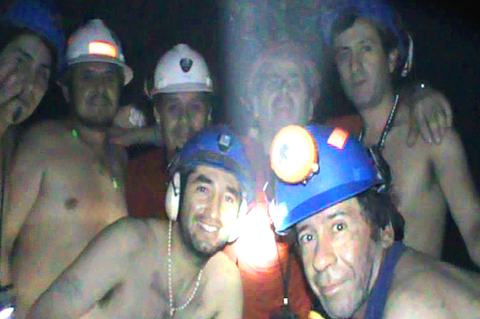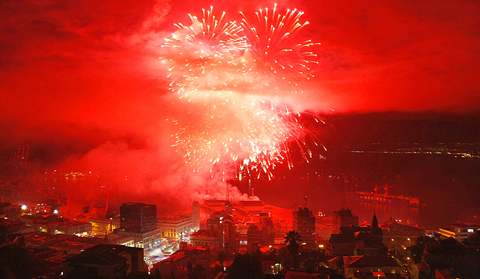Drilling equipment pounded its way into one of the caverns where 33 miners have been trapped for a month-and-a-half, completing a bore hole ahead of schedule on Friday and raising hopes that the men can be pulled out earlier than expected.
The 30cm wide drill guided by a pilot hole half its diameter reached 633m beneath the surface, puncturing the top of a passage near the chamber in the San Jose copper and gold mine where the men have taken refuge.
The next step is to place a wider drill on the rig and start a hole 71cm — wide enough for the miners to get out.

PHOTO: AFP
Video shot by the miners and released by the government later on Friday showed scenes of bedlam below when the drill broke through, sending a shower of water and rock down into the chamber.
“Viva Chile!” the miners cried, hugging each other and posing for the camera with broad smiles and headlamps beaming.
The survival of the miners trapped underground and the government’s unblinking effort to pull them out alive are giving Chileans reason to be proud as they celebrate their nation’s bicentennial this weekend.

PHOTO: REUTERS
Chile is poised to enter the world’s club of developed nations, with the kind of stable economic growth that Americans and Europeans once took for granted and a can-do ethos evident in Chilean President Sebastian Pinera’s spare-no-expense approach to saving the miners.
However, the mine disaster also is forcing Chileans to acknowledge aspects of their society that have been little talked about, particularly the plight of the Mapuche Indians, descendants of Chile’s original people.
“Chile is successful partly because we have inherited the Mapuche culture” of the nation’s original inhabitants, said Marta Lagos, director of the Latinobarometro regional survey firm based in Santiago.
“It’s an austere culture — hard, dry, tenacious, persistent — and all of this has to do with success,” she said.
The miners survived for 17 days after 700,000 tonnes of rock collapsed in the central section of the San Jose gold and copper mine on Aug. 5. They kept their wits, washing tiny bits of canned tuna and peaches down with sips of milk every other day to stretch a 48-hour emergency food supply. Above ground, their rescuers never gave up, despite bad maps of the mine that initially frustrated their attempts to reach their refuge with a narrow bore hole that eventually found them alive.
The government has refused to estimate the cost of the rescue effort, which now includes three huge drills working simultaneously to ensure the men are pulled out as quickly as possible. However, the drilling alone will cost nearly US$5 million, meaning the overall bill could reach US$10 million or more before the miners see sunlight.
Yesterday — the anniversary of Chile’s declaration of independence — would be the 46th day of their confinement.
These men went to work in a marginal and poorly financed mine already proven to be unsafe, precisely because the risks meant earning slightly better wages, netting up to US$19,000 a year. Their faces — displayed across the pages of Chile’s leading newspapers — reflect lifetimes of scratching out livings in difficult conditions.
Chile’s largest mining companies are flush with cash, apply modern safety standards and have access to the world’s best technology to extract the minerals that provide about 40 percent of the government’s revenue. However, the trapped miners work in the hardscrabble lower ranks of the industry, living on the margins.
Satisfaction over the rescue effort is balanced by frustration that Chile’s government hasn’t done more to provide for all of its people. It comes as 34 imprisoned Mapuche Indians are more than two months into a hunger strike, pressuring the government to stop applying a dictatorship-era anti-terrorism law to their sometimes-violent campaign to regain ancestral lands and receive reparations.
“In this famous bicentennial, the Mapuches don’t have anything to celebrate,” Mapuche leader Manuel Chocori said.
No Chilean government has ever fully recognized the claims of Chile’s original inhabitants, who had resisted the Spanish conquest for 300 years before a mix of settlers and Indians declared independence from Spain on Sept. 17, 1810, launching a war they finally won in 1818.
Only 6 percent of Chile’s 17 million people now define themselves as Mapuche in the nation’s census, although the vast majority have some Indian heritage.
While Chileans pride themselves on having Latin America’s strongest democracy — it has suffered only two coups in 200 years — it remains highly centralized. Most power is concentrated in the president, who appoints governors and leaders of huge state-owned enterprises such as the state-owned Codelco mining company.
Chilean society also has an authoritarian streak. Many welcomed — and some still long for — the 1973 to 1990 dictatorship of General Augusto Pinochet, who with boots and rifles imposed a free-market model on a country that had been experimenting with socialism.
A string of post-Pinochet leftist governments ended last year with the election of conservative billionaire Pinera, a hard-driving entrepreneur who pioneered credit cards and built LAN Chile into one of Latin America’s largest airlines.
He has promised to eliminate severe poverty, create 1 million jobs and make Chile “the best country in the world.”
Some say the Mapuches deserve just as much attention as the miners.
“Chile has a debt with the Mapuches that has been unpaid, not for just 200 years, but 500,” said author Isabel Allende, the niece of former Chilean president Salvadore Allende, the leftist leader who died while under siege during Pinochet’s coup.
Lagos also points to the Mapuches as important.
“This Mapuche issue is bringing to the surface a series of hidden aspects of our culture, which no one wants to show off,” she said. “It will be violent. It will be hard. It will be surprising to those who see Chile differently, as a peaceful country without ethnic problems, because we’ve hidden them.”

Kehinde Sanni spends his days smoothing out dents and repainting scratched bumpers in a modest autobody shop in Lagos. He has never left Nigeria, yet he speaks glowingly of Burkina Faso military leader Ibrahim Traore. “Nigeria needs someone like Ibrahim Traore of Burkina Faso. He is doing well for his country,” Sanni said. His admiration is shaped by a steady stream of viral videos, memes and social media posts — many misleading or outright false — portraying Traore as a fearless reformer who defied Western powers and reclaimed his country’s dignity. The Burkinabe strongman swept into power following a coup in September 2022

‘FRAGMENTING’: British politics have for a long time been dominated by the Labor Party and the Tories, but polls suggest that Reform now poses a significant challenge Hard-right upstarts Reform UK snatched a parliamentary seat from British Prime Minister Keir Starmer’s Labor Party yesterday in local elections that dealt a blow to the UK’s two establishment parties. Reform, led by anti-immigrant firebrand Nigel Farage, won the by-election in Runcorn and Helsby in northwest England by just six votes, as it picked up gains in other localities, including one mayoralty. The group’s strong showing continues momentum it built up at last year’s general election and appears to confirm a trend that the UK is entering an era of multi-party politics. “For the movement, for the party it’s a very, very big

ENTERTAINMENT: Rio officials have a history of organizing massive concerts on Copacabana Beach, with Madonna’s show drawing about 1.6 million fans last year Lady Gaga on Saturday night gave a free concert in front of 2 million fans who poured onto Copacabana Beach in Rio de Janeiro for the biggest show of her career. “Tonight, we’re making history... Thank you for making history with me,” Lady Gaga told a screaming crowd. The Mother Monster, as she is known, started the show at about 10:10pm local time with her 2011 song Bloody Mary. Cries of joy rose from the tightly packed fans who sang and danced shoulder-to-shoulder on the vast stretch of sand. Concert organizers said 2.1 million people attended the show. Lady Gaga

SUPPORT: The Australian prime minister promised to back Kyiv against Russia’s invasion, saying: ‘That’s my government’s position. It was yesterday. It still is’ Left-leaning Australian Prime Minister Anthony Albanese yesterday basked in his landslide election win, promising a “disciplined, orderly” government to confront cost-of-living pain and tariff turmoil. People clapped as the 62-year-old and his fiancee, Jodie Haydon, who visited his old inner Sydney haunt, Cafe Italia, surrounded by a crowd of jostling photographers and journalists. Albanese’s Labor Party is on course to win at least 83 seats in the 150-member parliament, partial results showed. Opposition leader Peter Dutton’s conservative Liberal-National coalition had just 38 seats, and other parties 12. Another 17 seats were still in doubt. “We will be a disciplined, orderly